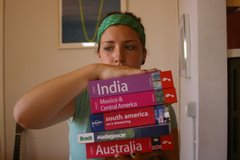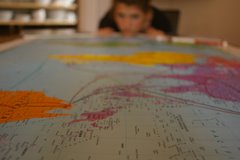 A month has passed since our return home …. how time flies! During these four weeks we have tried to re-establish our lives where we left off ten months ago, but actually it has not been easy. Indeed, more difficult for some than for others, but for all of us a change that we predicted but didn’t give much thought to. Some of our friends commented that we mustn’t get the post-partum blues – nine months with a clear objective that has now passed – well, maybe we are feeling them.
A month has passed since our return home …. how time flies! During these four weeks we have tried to re-establish our lives where we left off ten months ago, but actually it has not been easy. Indeed, more difficult for some than for others, but for all of us a change that we predicted but didn’t give much thought to. Some of our friends commented that we mustn’t get the post-partum blues – nine months with a clear objective that has now passed – well, maybe we are feeling them.After days, weeks and months travelling more than 100,000km, over 800 hours on the road in more than 10 distinct forms of transport, using more than 20 currencies, sleeping in over 100 new locations, in five different continents, reading more than 30 books, writing over 100 posts in two blogs plus a mountain of emails and hand-written letters , getting to know hundreds of people and taking thousands photographs whilst visiting new locations, villages and cities that we didn’t know and had previously never visited, picking up where we left off is proving impossible!
We have returned to our home, family, friends, neighbours and surroundings , but it is not the same, it is now different, we are different. Neither better nor worse, just different. We now know each other so much better, indeed we know ourselves much better. Taking off the pressure, the lack of expectations and the new experiences of each day, made it possible to take in everything that was happening both outside us and within. And tomorrow, if circumstances allowed, we would all do it again, without doubt, but as we have already done it once, the next time, if there is a next time, the experience will surely be something else.
I should have liked each of us to have written our point of view now that we have returned, as I tend to idealize everything and always see the glass half full, but part of our return has been returning to our old ways. Diana has started work and the girls, as they have no commitments whilst waiting to restart their education after the summer and meanwhile are looking for temporary work, have caught up with friends as much as possible and have enjoyed themselves, especially their nocturnal selves. Thus a month has passed without us writing any posts for either blog, for which we apologize.
This post will appear on both our blogs, so don’t bother checking the other one for a different welcome note. Yes, a welcome note, as this is not a farewell but our return to the life we thought was our reality, although now we wonder if this is the case.
With our love,
Manel, Diana, Ella and Blanche
family@carreras-david.com
 Ja ha passat un mes des de la nostra arribada a casa... com passa el temps! Aquestes quatre setmanes hem intentat reprendre les nostres vides on les vam deixar fa ara deu mesos i, la veritat, no ha estat fàcil. Per a uns més difícil que per a altres, però per a tots, un canvi amb què comptàvem però al qual potser mai dediquem gaires pensaments. Algun amic ens ha dit "que no us agafi una depre postpart" -per allò dels nou mesos i viure'ls amb un objectiu molt clar, que ara ja no hi és... Doncs gairebé ens agafa.
Ja ha passat un mes des de la nostra arribada a casa... com passa el temps! Aquestes quatre setmanes hem intentat reprendre les nostres vides on les vam deixar fa ara deu mesos i, la veritat, no ha estat fàcil. Per a uns més difícil que per a altres, però per a tots, un canvi amb què comptàvem però al qual potser mai dediquem gaires pensaments. Algun amic ens ha dit "que no us agafi una depre postpart" -per allò dels nou mesos i viure'ls amb un objectiu molt clar, que ara ja no hi és... Doncs gairebé ens agafa.Després de dies, setmanes i mesos recorrent més de 100.000 quilòmetres, durant més de 800 hores de viatge, en més de 10 mitjans de transport diferents, a través de cinc continents diferents, usant més de 20 divises, dormint en més de 100 llocs nous, llegint més de 30 llibres, escrivint més de 100 posts en dos blocs i un munt de correus electrònics i cartes manuscrites, coneixent centenars de persones i fent milers de fotografies mentre visitàvem llocs, pobles i ciutats que no coneixíem i on no havíem estat mai, tornar on ho havíem deixat tot no és possible. Tornar a casa, amb la família, amics, veïns i entorn sí, però ja no és el mateix, ara és diferent, nosaltres som diferents. Ni millors ni pitjors, diferents. Entre nosaltres ens coneixem moltíssim més, així com cada un a ell mateix, perquè aquest temps també ha estat un viatge cap a nosaltres mateixos, on la falta de pressió, la falta d'expectatives i la novetat diària ens ha permès absorbir-ho tot, el de fora i el de dins. I demà, si poguéssim i les circumstàncies es tornessin a donar, ho repetiríem, sens dubte, tots i cada un de nosaltres, però com que ja ho hem fet, doncs la pròxima vegada, si hi és, l'experiència ben segur que serà una altra.
M'hauria agradat que cada un de nosaltres escrivís sobre la seva visió ara que ja hem tornat, perquè jo tendeixo a idealitzar-ho tot i sempre que hi ha un got el veig mig ple, però part del retorn ha estat tornar a rutines anteriors. La Diana s'ha reincorporat a la seva escola i les noies, com que no tenen "obligacions" mentre esperen reprendre els estudis al setembre i busquen feina per a aquests mesos, han recuperat tot el "temps perdut": han vist les seves amistats tant com els ha estat possible i han disfrutat de la vida, sobretot la nocturna. Així, hem passat un mes sense escriure cap post nou per als blocs, de manera que us demano mil disculpes; a més aquest serà compartit entre les dues "https", o sigui que no fa falta que busqueu si en l'altre bloc surt una altra versió de la nostra benvinguda, perquè és la mateixa. Dic benvinguda, ja que això no és cap comiat de res, sinó el nostre retorn a la vida que pensàvem era la real, i evidentment ara en tenim molts dubtes.
Amb afecte,
Manel, Diana, Ella i Blanche
family@carreras-david.com















